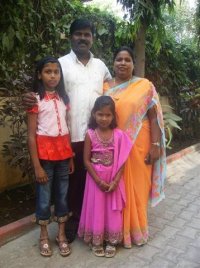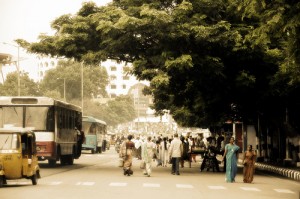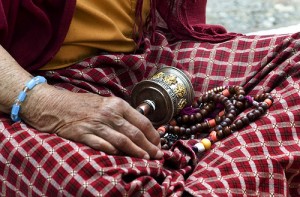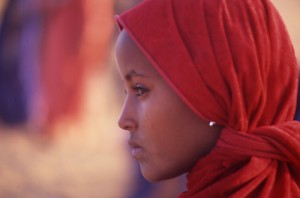You are here:
Home / Archives for September 2010
Posted by Reach The Unreached on September 14, 2010 · Leave a Comment
“We have never seen a wedding like this,” said the smiling cousin of the groom as he greeted Dany (not his real name), a church planter among his own Wadar people.
The Wadar are some of the poorest people in Maharashtra, India. For many, the main livelihood is cutting rocks.
It was the wedding of Shankar, one of the first believers in a church planting work in Pune, India. Shankar grew up as a neglected orphan, yet somehow tied an influential extended family. The family had been happy when he had quite school to start earning a meager living as a digger. When he accepted Jesus, he eagerly began to learn about God and obey Him. His family pressured him to marry a Hindu girl of their choice and when he refused, they disinherited him.
When he later announced his engagement to another believing Wadar girl, a relative of Shankar’s named Hanuman showed up to confront the church planter Dany at his home, with a gun and a gang of thugs.
 Dany, a former gang leader, had grown up not knowing anything about Jesus or Christianity, except that Christians were bad. When he was a young adult he started to persecute Christians. Eventually when he was away in another city looking for work, he learned of God and acknowledged Jesus’ sacrifice on the cross and made Him lord of his life. As a result, Dany could not go back to his home town as people there wanted to persecute him.
Dany, a former gang leader, had grown up not knowing anything about Jesus or Christianity, except that Christians were bad. When he was a young adult he started to persecute Christians. Eventually when he was away in another city looking for work, he learned of God and acknowledged Jesus’ sacrifice on the cross and made Him lord of his life. As a result, Dany could not go back to his home town as people there wanted to persecute him.
Later after getting married, Dany wanted to reach his own people group. He and his wife Noel (not her real name) moved to Pune in 2001 and began a work among the Wadar. At that time, there were over 2 million Wadar with no church or organization working among them. They had no written language, no Bible, no Christian literature, or worship songs in their language.
“We do not want to fight,” said Dany, a veteran of many such fights, as he calmly and deliberately reasoned with Hanuman and the gang.
Five weeks later a smiling Hanuman and his family were among the few relatives that showed up for Shankar’s wedding, bringing a generous gift. Wadar weddings are often marked by loud drunken brawls, usually over the value of the gifts or the quality of food. But this wedding was different – peaceful and full of goodwill for the bridal couple.
Shankar and his wife to be received pre-marital counseling to help them truly partner together in life, as well as in ministry. Such an approach is important among the Wadar as the Gospel begins to penetrate the foundation of human relationships. Helping Shankar to leave behind the model of dominating, violent, and alcoholic men, and to genuinely love his new wife is huge.
Shankar is now one of the leading elders, and in charge of one of the 4 house churches planted in the city. He is still unable to read or write but he learns and teaches through story telling.
The work among the Wadar continues to grow with more churches, a shortwave radio broadcast in Wadari and the first Wadari worship CD. Now with 600-800 known believers, the Wadari are being reached and transformed by the Gospel.
Dany, Noel and their two daughters live in a one bedroom apartment. They are quite happy there, but all the rents in Pune are going up and they need more monthly support to help pay for the apartment and not have to move.
Posted by Reach The Unreached on September 14, 2010 · Leave a Comment
In his college days, Ravi was a self-proclaimed atheist and communist. He was the leader of a political student group at his college, and was severely injured by an opposing political group during a demonstration. While in the hospital one of his attending nurses shared the Gospel with him, but he rejected her every word. For four days the nurse prayed and persevered, and on the fourth day Ravi understood his situation with God and decided to follow Christ.
After a time Ravi knew God had called him to ministry. However, Ravi was now married, and his wife was not convinced. She knew a life of ministry would not be easy. So Ravi fasted and prayed for fifteen days, asking God to change his wife’s heart. God answered and together they decided they would follow God, no matter the consequences.
 Over the next several years, Ravi and his wife planted two churches and during that time had two sons. Times were difficult however, and one of their sons developed a life-threatening sickness. Unable to afford medicine, Ravi and his wife watched as their first-born son went to be with the Lord. The following year their younger son fell down a well in the village. Again, unable to pay for the medical attention necessary to save him, he too died.
Over the next several years, Ravi and his wife planted two churches and during that time had two sons. Times were difficult however, and one of their sons developed a life-threatening sickness. Unable to afford medicine, Ravi and his wife watched as their first-born son went to be with the Lord. The following year their younger son fell down a well in the village. Again, unable to pay for the medical attention necessary to save him, he too died.
Wracked with grief, Ravi and his wife clung to God even more closely and pressed in to the work God had called them to. The two churches they had planted continued to grow. Ravi was introduced to the director of an established ministry that equipped nationals to plant churches and reach nationals for Jesus Christ. Ravi was invited to join this church planting network. As part of the network, Ravi received theological training, resources and coaching to help him in his calling. He began receiving a monthly stipend to lighten the burden of providing for his family.
Today, Pastor Ravi oversees the entire network of church planters in the state of Andhra Pradesh. God has blessed Ravi and his wife with two beautiful daughters, and together they continue to plant churches and proclaim the Gospel in India.
Posted by Reach The Unreached on September 9, 2010 · Leave a Comment
Joshua Project, a ministry of the U.S. Center for World Mission is an incredible resource for understanding the task remaining as it relates to Unreached people groups. Joshua Project is a research initiative seeking to highlight the ethnic people groups of the world with the least followers of Christ.
 Joshua Project seeks to answer the questions that result from the Great Commission’s call to make disciples among every nation or people group:
Joshua Project seeks to answer the questions that result from the Great Commission’s call to make disciples among every nation or people group:
- Who are the ethnic people groups of the world?
- Which people groups still need an initial church-planting movement in their midst?
- What ministry resources are available to help outreach among the least-reached?
In doing so, they have gathered in depth statistics on the over 6,500 people groups that are Unreached/least-reached, based on the criteria of less than 2% Evangelical and less than 5% Christian adherents.
They have great graphics and tools to be able to locate where in the world the different Unreached people groups are located. One of the coolest tools they have is “Unreached in Google Earth.” You can zoom in around the world and see where the Unreached are located and get specifics on each of the different groups.
They also have a graphic on their start page called “Find Unreached People,” where you can drag your curser across a map of the world and as you do so, the “Unreached people group status” of each country pops up.
The Joshua Project is one comprehensive website. Spend some time looking it over and get an idea of what’s left to do as it relates to finishing the task of going and making disciples of all the nations/peoples.
Posted by Reach The Unreached on September 7, 2010 · Leave a Comment
 Urbana – InterVarsity Christian Fellowship’s triennial student mission convention held at the University of Illinois at Champaign has had some 225,000 attendees since its first get together in 1946.
Urbana – InterVarsity Christian Fellowship’s triennial student mission convention held at the University of Illinois at Champaign has had some 225,000 attendees since its first get together in 1946.
If you are an alum of Urbana, you’ve been challenged to participate in the Great Commission. After attending Urbana, whether it was the last one in December or one of the conventions earlier on, you’ve no doubt thought “how can I be involved, how can I make a difference in reaching the Unreached people of the world?”
Reach The Unreached would like to help you to have a part in reaching the remaining Unreached people groups in the world. We would like to help you be an integral part in fulfilling the Great Commission
If you’re like those of us who are involved with Reach The Unreached, you’ve had a desire to get your gifts invested with those who are “in the field,” actually doing the work of reaching the people groups still lacking a viable body of Christian believers.
There are some 16,000 people groups in the world today, and of those, over 6,000 are still Unreached. They don’t have an indigenous community of believing Christians able to evangelize their own, resulting in the establishment of a significant witness among their culture. This is a gaping hole in the fulfillment of the Great Commission!
We can help you get your donations into the hands of those who have made the commitment to live among the Unreached, endeavoring to establish God’s Kingdom. We’ve made it easy for Urbana alumni to invest in the Kingdom, as it relates to supporting those who are on the “frontlines” living among the Unreached people groups.
 Joshua Project seeks to answer the questions that result from the Great Commission’s call to make disciples among every nation or people group:
Joshua Project seeks to answer the questions that result from the Great Commission’s call to make disciples among every nation or people group: Urbana – InterVarsity Christian Fellowship’s triennial student mission convention held at the University of Illinois at Champaign has had some 225,000 attendees since its first get together in 1946.
Urbana – InterVarsity Christian Fellowship’s triennial student mission convention held at the University of Illinois at Champaign has had some 225,000 attendees since its first get together in 1946. Dany, a former gang leader, had grown up not knowing anything about Jesus or Christianity, except that Christians were bad. When he was a young adult he started to persecute Christians. Eventually when he was away in another city looking for work, he learned of God and acknowledged Jesus’ sacrifice on the cross and made Him lord of his life. As a result, Dany could not go back to his home town as people there wanted to persecute him.
Dany, a former gang leader, had grown up not knowing anything about Jesus or Christianity, except that Christians were bad. When he was a young adult he started to persecute Christians. Eventually when he was away in another city looking for work, he learned of God and acknowledged Jesus’ sacrifice on the cross and made Him lord of his life. As a result, Dany could not go back to his home town as people there wanted to persecute him. Over the next several years, Ravi and his wife planted two churches and during that time had two sons. Times were difficult however, and one of their sons developed a life-threatening sickness. Unable to afford medicine, Ravi and his wife watched as their first-born son went to be with the Lord. The following year their younger son fell down a well in the village. Again, unable to pay for the medical attention necessary to save him, he too died.
Over the next several years, Ravi and his wife planted two churches and during that time had two sons. Times were difficult however, and one of their sons developed a life-threatening sickness. Unable to afford medicine, Ravi and his wife watched as their first-born son went to be with the Lord. The following year their younger son fell down a well in the village. Again, unable to pay for the medical attention necessary to save him, he too died.